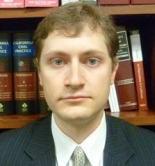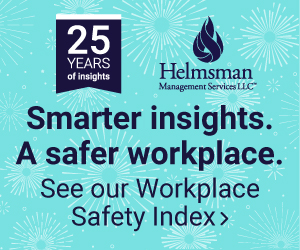Industry Insights
November 30, 2021
Grinberg: Section 31.7 Bypassed With Order for Additional Panel
- State: California
- - 0 shares
I bring to your attention, or what I can capture of it between bites of Turkey leftovers, the panel decision in the case of Gonzalez v. Central California Child Development Inc.

Gregory Grinberg
Applicant, a janitor, alleged an industrial injury to the right ankle. The orthopedic PQME was no longer available, so the workers' compensation judge ordered the parties to get a replacement in the same specialty.
Applicant sought reconsideration, however, arguing that there should be an order for an additional panel in the specialty of rheumatology to address applicant’s complex regional pain syndrome.
The original qualified medical evaluator died, so it was necessary to replace him via a new panel in the same specialty, orthopedic surgery. However, the Workers' Compensation Appeals Board did not find that the parties should first submit this matter to the new orthopedic QME to determine if there is CRPS and whether the orthopedic QME can address all issues.
From the panel opinion: “In this case, it appears that a second panel is warranted based on the record in order to promote an expeditious resolution of this case. Based on [the deceased QME’s] deposition, including the exhibits attached to it, a rheumatology panel will provide additional evidence on the causation of CRPS.”
The procedure for obtaining an additional panel in a different specialty, as would be the case with this second panel in rheumatology, can be found in 8 CCR Section 31.7. There, the guidance is to try to have the original agreed medical evaluator or QME resolve any new medical disputes (such as the existence and/or cause of CRPS) before obtaining a new panel. That hasn’t happened here.
The defendant was not able to complete discovery on an opinion regarding CRPS because of the doctor's death. Further, the new orthopedic PQME may be able to address the matter without defendant incurring the significant cost of an additional medical-legal evaluator.
Instead of expediting the resolution of a case, a second QME in a different specialty often grinds progress to a halt. As soon as discovery is complete with one QME, the opinions of the other are suddenly “stale” and the entire process must begin again. A party inclined to drag out a case and delay resolution certainly has ample opportunity to do so when there are two QMEs to comment on the claim.
If I were king of workers’ compensation, absent an agreement to the contrary, the parties would have to go through the process outlined in Section 31.7 before the defendant is forced to incur the costs and delays of a second QME. But we are Americans and we tolerate no kings, so here we are instead.
Gregory Grinberg is managing partner of Gale, Sutow & Associates’ S.F. Bay South office and a certified specialist in workers’ compensation law. This post is reprinted with permission from Grinberg’s WCDefenseCA blog.
Advertisements
Columns
- Geaney: What Questions Should Permanency Evaluators Ask Petitioners? 01/28/26
- Paduda: Health Care Is Missing the Point 01/26/26
- Kamin: AI Citations Present Cautionary Tale for Attorneys 01/20/26
- Barthel: Is Rodriguez Worth It? 01/16/26
- Tolentino: Keep Your Friends Close, but Your Enemies Closer 01/14/26
- Young: The Top 2025 California Workers' Comp Developments 01/09/26
- Langham: Not Always an Accident 01/07/26
- Barthel: Is SIBTF a Great Idea Gone Awry? 01/05/26
- CAAA: New Comp Laws Take Effect in 2026 12/31/25
- Opalisky: The Ongoing War Over State's Statutory Employer Doctrine 12/30/25
- Kamin: Our Top 10 Blogs of 2025 12/26/25
- Barthel: Are You an Employer, or Do You Use Independent Contractors? Can You Prove It? 12/24/25
- Barthel: Is Pot a Defense? Are You High? 12/22/25
- Barthel: Is Dubon II on the Way Out? 12/17/25
- Montgomery: San Fran City Official Stole $627k From Workers' Comp Division 12/10/25
- Kamin: Ring the Bells for Settlement Season 12/08/25
- Paduda: Does Comp Care About Workers? 12/05/25
- Sandoval: Throwing Subrogation Under the Bus 12/03/25
- Johnson: Some Thoughts on Apportionment - And SIBTF 11/20/25
- Montgomery: State's First Responders May File Comp Claims for Trauma 11/14/25
Now Trending
- Workers' Compensation News
-
Calif. DWC
Proposes Attorney Fees for…
Posted on Jan 28, 2026
-
Calif. High Court
to Review Rodriguez Ruling on WCAB
Jurisdiction Over Medical…
Posted on Jan 26, 2026
-
Calif. City
Attorney Announces $4.5M
Misclassification…
Posted on Jan 22, 2026
-
Iowa Report: Owner
of Waste Management Company Admits
to Not Having…
Posted on Jan 23, 2026
-
Calif. Broker Not
Bound by Duty of Care to
Contractor's…
Posted on Jan 22, 2026
-
Ariz. No Benefits
for Man Who Accidentally Shot…
Posted on Jan 23, 2026
-
Calif. Kids'
Chance of California Announces
Board…
Posted on Jan 28, 2026
-
N.Y. Attorney's
Improper Communication With Doctor
Results in Denial of Worker's…
Posted on Jan 22, 2026
-
Hawaii Bills Focus
on Medical Treatment, Unpaid…
Posted on Jan 27, 2026
-
Hawaii Bill Cites
Inflated Rates as Reason to Ban
Certain…
Posted on Jan 22, 2026
Jobs
- Defense WC Attorney Wanted- We will beat any offer for the right candidate. Low billables, real bonuses and fast track equity partnership
- Associate Attorney
- WC DEFENSE ATTORNEY (REMOTE)
- AA Work Comp hearing rep or attorney: Remote Job
- ATTORNEY - Workers Comp Defense
- Legal Assistant/Paralegal–Workers’ Comp
- Attorney for Northern California Workers' Compensation Jobs
Upcoming Events
Mar 3-4, 2026
Save The Date! WCRI’s 2026 Ann
Registration will open up in the coming months. We'll see you there! - Leading national workers' …
Mar 5-6, 2026
DWC’s 33rd Annual Educational
Register Now! 2026 conference topics: DWC Update AI with a Claims Focus Medical and Legal Ethics …
Mar 19-20, 2026
DWC’s 33rd Annual Educational
Register today! 2026 conference topics: DWC Update AI with a Claims Focus Medical and Legal Ethi …
Social Media Links
c/o Business Insurance Holdings, Inc.
Greenwich, CT 06836




No Comments
Log in to post a comment